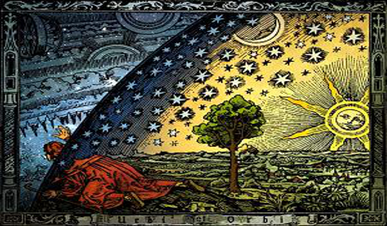John, Tom and Katie - all younger than 20 - live in the same flat. One day, John goes out. By the time he comes back, he finds Katie dead on the floor, amidst broken glass and a puddle of water. Tom, very much alive, is towering over her body. John sighs: "Oh no! I should have closed the window."
What happened?
What happened?
If you're puzzled by John's seemingly bizarre reaction and have no idea towards a solution, you probably assume that John, Tom and Katie are all humans. You are the victim of an assumption you haven't even noticed you've made. Without that assumption the pieces of the story quickly come together: Tom's a cat and Kathie was a gold-fish. She died when the draft - coming from the open window - knocked her little fishbowl off the table.
We all make assumptions. And that is quite all right, as we wouldn't be able to think without them. However, assumptions become dangerous if we mistake them for facts.
Science has its own assumptions. Again, there is nothing wrong with that, because we cannot think in a vacuum. However, we must ask how well those assumptions are serving our understanding of reality.
We all make assumptions. And that is quite all right, as we wouldn't be able to think without them. However, assumptions become dangerous if we mistake them for facts.
Science has its own assumptions. Again, there is nothing wrong with that, because we cannot think in a vacuum. However, we must ask how well those assumptions are serving our understanding of reality.
|
The currently leading paradigm of scientific materialism is based on the assumption that there is an objective, natural world out there, which is "real" in the sense that it exists according to eternal, natural laws and independent of the observer. In other words: the world is based on matter (atoms and molecules) and consciousness is derivative of it.
This assumption has brought humanity great comforts and advances: from cars to airplanes, from the telephone to the internet. But the same paradigm spectacularly fails to explain anomalies which come up in greater and greater numbers. How does scientific materialism, for example, react to the following facts: |
☼ In the US alone, 13 million adults have reported cases of near-death experiences in which they felt their consciousness was separated from their bodies.
☼ Anthropological data points out that 80-97% of all indigenous cultures in the world have techniques to alter their states of consciousness and deliberately induce out-of-body experiences.
☼ Over one third of the entire American population reported that they have experienced or witnessed a "divine healing" of an illness or injury personally.
☼ Anthropological data points out that 80-97% of all indigenous cultures in the world have techniques to alter their states of consciousness and deliberately induce out-of-body experiences.
☼ Over one third of the entire American population reported that they have experienced or witnessed a "divine healing" of an illness or injury personally.
|
Of course, scientific materialism will go into denial upon hearing such facts. A thinker with narrow world-view will defend materialism just as vehemently as a religious fundamentalist his dogmas. There will be very little to nothing you can do to convince them.
We must, however, also remember that there's nothing "wrong" with science itself. Science does not in any way need to contradict spiritual learning, quite the contrary, the two should mutually complement each other. Science gives us a profound understanding of the physical reality we live in. |
But the idea that the world is based on matter, and consciousness is nothing but a product of matter, is not scientific fact. It is merely a scientific assumption. It is equally scientific to assume that the world is based on consciousness, as long as we continue to think in a logical and responsible way.
To assume that the world is based on consciousness leaves us with greater freedom to explore the nature of reality, as we will not be forced to ignore accounts about non-physical experiences. At the same time, we can remain faithful to science, by applying logical thinking and careful examination of all available data.
To assume that the world is based on consciousness leaves us with greater freedom to explore the nature of reality, as we will not be forced to ignore accounts about non-physical experiences. At the same time, we can remain faithful to science, by applying logical thinking and careful examination of all available data.



